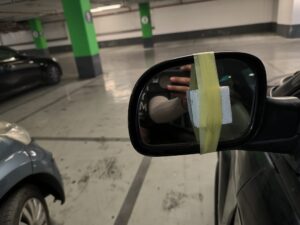Having two children on the autism spectrum and befriending many parents of autistic kids, I realized that I have a very different approach to dealing with their autism than many parents do.
I grew up with autism. I have quite a few family members on the spectrum. In fact, more than 50% of my immediate family is on the spectrum, and that includes my family of birth as well as the family I am raising. Autism is not something remotely foreign to me.
And yet, it was something that I had to learn more about. For so long, I thought of autism as just a collection of issues people had, and any bad traits that the autistic people I knew had, I associated with autism, and assumed they were part and parcel of that identity and diagnosis.
When I first suspected my son Ike was autistic, I was very torn. I didn’t want him to be autistic, because I didn’t want him to have the negative traits I associated with autism. Fortunately, I talked to some good friends who also had quite a few autistic family members who had a vastly different experience with them as I did, and it helped me realize that what I assumed was autism was actually not, and that autism is very different than what I had originally thought it to be, despite growing up surrounded by it. It also helped me become a lot more accepting of the idea, and eager to learn more.
And learn more I did. I learned so many things about autism that other people don’t generally talk about. I learned that autism is not something bad or wrong, its just a different way their brain works. And just as there are many different types of hair colors and eye colors, no one better than the other, there are many different types of brains, some autistic, some not. This is part of the neurodiversity movement, something I’ve learned about, and because of it, I no longer pathologize autism, but realize that it is simply a different way that their brain works.
Because of this, when my son Ike was eventually diagnosed with autism at the age of six, I told him about it right away.
It’s not something shameful. My son isn’t broken.
The only problem is that my brain works differently than his, and sometimes because of that, I don’t understand why he is doing things the way he is doing them, or I don’t anticipate or understand his needs enough, and he doesn’t understand mine. That doesn’t mean anything is wrong, its more like a language barrier. And the answer to that is to both learn to speak each others languages. For me to learn more about what makes an autistic kid tick, and for him to understand more about why society as a whole has certain expectations, etc.
I’ve learned more about autistic kids and their sensory needs. For some it is a need for sensory seeking. For others, its sensory avoidance. For most, its a combination of both.
Autistic people tend to be more emotionally sensitive. This has its perks and its downfalls.
Autistic people tend to be very strong willed. Some might see this as stubborn, but its also tenacious. Never giving up.
Autistic people see the world from a different perspective.
Autistic people are more likely to be willing to push aside social norms if they don’t go hand in hand with their goals or beliefs.
There’s a reason that some of the greatest scientists and inventors in the world were most likely autistic.
Thomas Edison. Einstein. Motzart. Newton. Bill Gates. Steve Jobs.
That seeing the world from a unique perspective? Coupled with that strong willed tenacity? Willing to buck conventional norms and be different? You need those to get an Edison who tried 99 times and failed before he invented the lightbulb. You need that to be a Sir Isaac Newton who gets demonized. Or to be Greta Thunberg. (Like her or not, you still need tenacity and a willingness to buck social norms to do what she is doing.)
There are so many myths about autism and empathy. But those who say people who are autistic lack empathy are completely wrong. If autistic people lacked empathy, famous autistic Temple Grandin wouldn’t have been made famous for her push for humane treatment of livestock for slaughter. Autistic people often miss certain body language cues, but when given direct information about someone else’s feelings are often the first to empathize, especially because they, too, have strong emotions that are sometimes really hard to handle.
For this reason among others, I strongly oppose ABA therapy that is essentially “conversion therapy” for autistics, to try to get them to be non autistic via rewards and punishments, teaching them compliance to our social norms, instead of trying to help meet their needs in a society not built for them.
However, many people don’t agree with me. Many people view autism as something broken that needs fixing. View autism as shameful.
For that reason, they don’t want to tell their child about their autism. They think that knowing it will be detrimental. “Why do you need to label your kid?”
So let me tell you a little bit about labels.
The problem with a label is when you view something as negative, and you tell a kid something negative about themselves, they likely will view themselves in a negative light. So if you see autism as something wrong with your kid, there’s a good chance you’ll want to hide that from your kid. But if its something neutral, you don’t hide it. Do you hide neutral “labels” from your kid, like their blood type? (Sorry, it isn’t easy to think of neutral labels that are easy to hide.)
Quite a few times I’ve heard parents wondering about whether or not they should tell their kids that they’re autistic. Many parents I know are are opposed to getting a kid diagnosed with anything, and think that labels are just harmful.
Let me just say that I know adults that only now are figuring out that they are autistic, and when they tell their parents, their parents said that they suspected it the whole time. These friends are filled with a lot of resentment over their parents not sharing something like that with them, because as adults they feel almost like they need to reinvent the wheel. Imagine how much worse they’d feel if they knew their parents knew for a fact that they were autistic, but deliberately kept this important information about them a secret from them? I could imagine feeling extremely, extremely betrayed.
A word about labels.
I may not be autistic (I spoke to my psychiatrist about it, and he said there’s a chance, but if I am, its only a slight chance, that most of the symptoms I’m referring to apply to my general diagnosis) but I only got diagnosed with my mental health issues at the age of 28 or 29.
You know the song from Moana, “How Far I’ll Go“?
There’s one line from it that summed up most of my childhood and honestly, most of my adulthood too, when Moana asks “What’s wrong with me?”
My brain may not be autistic, but it definitely ticks differently. Or rather, it tocks when “most” brains tick. And for most of my life, I was depressed and upset about so many different things in my life, but predominantly, thinking there was something wrong with me, because I wasn’t able to do things or understand things or see the world in a way that I felt was conducive to a happy and productive life.
Until one day.
Until one day, someone close to me told me about a diagnosis of theirs, and when I asked for more information, I realized that they were describing me. To a tee!
Yes, it came with some emotional upheavals, like challenging my misconceptions about this diagnosis that I had because of negative stereotypes. But once I got past that, my life has gotten so much better.
Finally, I realized that I’m not doing anything wrong, there is nothing wrong with me. I just am B when many other people are A. And some people are C. Others are every other letter of the alphabet. Just because you’re different doesn’t mean there’s anything wrong with you. This has been the biggest part of my self acceptance journey.
Now that I know that I am B, when there’s something going on with me, instead of wondering what is wrong with me, wondering why I can’t do X, or why I always do Y, because of my knowledge of B I am able to put words to what is going on, I have a vocabulary related to B, that I am able to use to express myself and understand myself better.
It’s beautiful.
Yes, there are some parts of my B label that frustrate me, and those are things I am working on in therapy, not to change myself, but to be able to manage better in this world, to be more effective and reach my goals. I was able to find a therapist who works with patients that are B. And I am able to understand myself so much better and find a community of people who understand me as well. Additionally, there are other parts of my B label that I would never give up, that I am proud of, that I feel make me the awesome person that I am today.
Without that label, I would be just as confused. Labels can be a curse if you view them as one, but if you approach it with an open mind, you can see that a label can be a blessing, a way to understand yourself, helping you reach that “click” moment where your brain and your actions start making sense to you, that you understand what makes you do certain things and respond certain ways.
Why wouldn’t you let your child have that?
I want my children to love themselves. And to love yourself and accept yourself you need to also understand yourself, and without a label, you’re just swimming in circles trying to reach shore, when there is a flotation device with the label being deliberately kept out of reach by someone else who thinks that it is “for your own good”.
Don’t do that to your kid.
And as for society… If you’re worried what society will say once they find out your kid is autistic? First of all, if you’re that afraid, you don’t need to tell people. But I do think that is the wrong approach.
Forget the fact that autistic people tend to be more quirky, and if someone will mistreat someone because they hate autistic people and are bigots, they’ll likely do the same if the person is quirky even without the autism label.
But I see it like this.
Lets say you’re Muslim or Jewish, and you live in an area rife with Islamophobia or Antisemitism. Would you not tell your kid that they are Muslim or Jewish, even though it is a big part of their identity and the reason why you do certain things?
People to deserve to know the truth about themselves. Deliberately withholding the truth about someone’s identity because you’re afraid they’ll embrace their whole self is wrong and the opposite of what parents should do, and deliberately withholding the truth about their identity because of others bigotry is giving in to other peoples bigotry and hurting your kid in the process.
Please.
Learn from people who are autistic. Learn what beautiful, full, enriching, wonderful lives they have. See the quirk as beautiful. There’s an importance in diversity. We need all the colors of the rainbow. And teach your child about what it is to be them, about their unique challenges, and their unique strengths.
Do it for their sake.
They’ll thank you for it.







0 Responses
Beautiful and smart post. You gave me a new persoective towards my own mental condition.
Beautiful and smart post. You gave me a new persoective towards my own mental condition.
What an excellent gesture here. I so much concur with what you are saying here. Autism as a neurological impairment presents with a lot of challenges. People leaving with autism should be encouraged, nurtured and helped to lead a normal or near normal lifestyle and not neglected.
I agree with you however many autistic children are not self aware I tried explaining to my son about his autism and he just doesn't get it. But he is happy and smiley and has friends